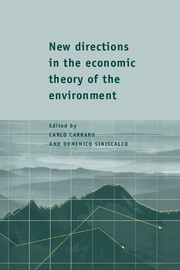Book contents
- Frontmatter
- Contents
- List of contributors
- 1 Theoretical frontiers of environmental economics
- 2 Growth with natural and environmental resources
- 3 Environmental policy and technological innovation
- 4 Environmental policy, distortionary labour taxation and employment: pollution taxes and the double dividend
- 5 International coordination of environmental taxes
- 6 Environmental policy and international trade
- 7 Environmental regulation and international capital allocation
- 8 Towards a theory of international environmental cooperation
- 9 Group formation in games without spillovers
- 10 Non-cooperative models of coalition formation in games with spillovers
- Index
6 - Environmental policy and international trade
Published online by Cambridge University Press: 11 January 2010
- Frontmatter
- Contents
- List of contributors
- 1 Theoretical frontiers of environmental economics
- 2 Growth with natural and environmental resources
- 3 Environmental policy and technological innovation
- 4 Environmental policy, distortionary labour taxation and employment: pollution taxes and the double dividend
- 5 International coordination of environmental taxes
- 6 Environmental policy and international trade
- 7 Environmental regulation and international capital allocation
- 8 Towards a theory of international environmental cooperation
- 9 Group formation in games without spillovers
- 10 Non-cooperative models of coalition formation in games with spillovers
- Index
Summary
Introduction – the issues
There are three main factors linking environmental policies and international trade. First, to the extent that international trade affects both the extent and the pattern of production and consumption of goods in different countries, if these production and consumption activities have external, detrimental, effects on the environment of the countries where consumption and production take place then trade will affect the environment; policies which affect trade will affect the environment and policies which affect the environment will affect trade. Second, production and consumption activities in one country could have international spillover effects on the environment of other countries – as in the acid rain problems of Europe and North America, the problems of pollution of rivers such as the Rhine or global commons problems such as climate change. While such transboundary pollution problems could arise in the absence of any trade between countries, if there is trade between the affected countries, then, in the absence of any direct agreement between the countries to deal with transboundary environmental problems countries may use trade policies to affect the pattern of production or consumption in other countries, and hence the amount of transboundary pollution to which they are exposed. This is related to the third factor: international trade policies may be used to enforce international environmental agreements, not necessarily with a view to directly affecting the pollution generated by that country but simply as part of package of sanctions for failing to join or comply with an international environmental agreement.
- Type
- Chapter
- Information
- New Directions in the Economic Theory of the Environment , pp. 147 - 192Publisher: Cambridge University PressPrint publication year: 1997
- 7
- Cited by

